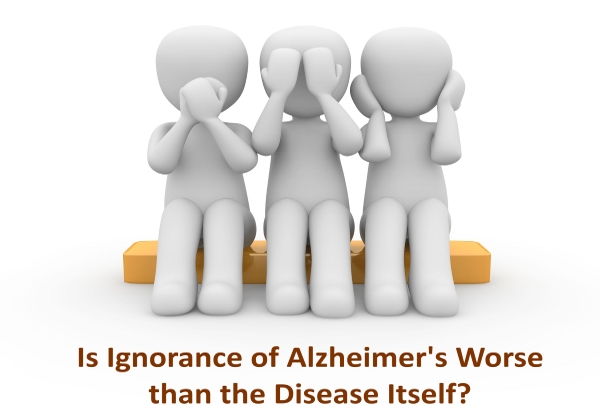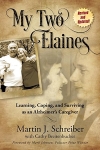Contributing Writer: Marty Schreiber, author of My Two Elaines: Learning, Coping, and Surviving as an Alzheimer’s Caregiver

My wife Elaine and I knew her Alzheimer’s diagnosis 14 years ago would take us on a journey neither of us wanted. We believed that with one another, we could get through it.
As I look back, what surprised me was that healthcare providers didn’t seem to know any more about dealing with Alzheimer’s than we did. Sure, they treated Elaine with what they could, but what about me? I’m part of this diagnosis!
I desperately wanted to keep things normal when the situation was anything but. How am I supposed to calm Elaine when she insists she’s cold and it’s 95 degrees?
Is there a way to calm her when she’s agitated simply because there are other people in the room? How do I respond to the same question she repeats time and again?
Healthcare providers didn’t offer me any decent advice. They failed to tell us that with a few modifications, we could steal moments of joy before and after Elaine would forget names, relationships, lose her ability to read, write, ride a bike or enjoy an afternoon walk.
Unfortunately, there is no first-aid kit for caregivers.
Like many who care for a loved one with Alzheimer’s, guilt ate me alive. I felt like I could have done more – should have done more. I realized that I could have entered Elaine’s world sooner, and opportunities for happiness slipped away.
Over time, I learned to let go of the guilt. As I share with others, we need to do that to be a better caregiver.
Ignorance of dealing with Alzheimer’s is an enemy of happiness, productivity and comfort. Ignorance of the disease leads to more anxiety, heartbreak and depression. Bluntly, Alzheimer’s takes a terrible toll on caregivers.
What I know now and hope other Alzheimer’s families learn so they don’t endure the steep and seemingly ever-climbing learning curve:
No Nos — You’ll never win an argument with this disease. When your loved one says she’s hungry after a 4-course meal or wants to listen to the same song for the 25th time that day, don’t say ‘no.’ Redirect the conversation and move on.
It’s the Alzheimer’s talking – When your loved one with Alzheimer’s doesn’t know you or your family, or acts irritably, they don’t mean to annoy you. It’s because the brain is unwell. Alzheimer’s over time essentially creates a different person. In our case, Elaine looks the same and smiles beautifully as ever, but lives in an increasingly shrinking world.
“Only when I let go of my First Elaine could I love my Second Elaine for who she is now.”
Therapeutic fibbing – It’s ok to tell someone with Alzheimer’s a white lie when it means sparing another round of grief. When Elaine asked about her parents and I told her they were both dead, the sadness on her face devastated me.
That would be the last time I would upset her by speaking about the real world. It’s her world now, and I will do my darndest to be sure she feels happy and secure.
Self-care is all-care — Take care of yourself. Rules about affixing an oxygen mask before you help a loved one goes beyond an airplane security directive. According to the Alzheimer’s Association, the disease takes a devastating toll on caregivers.
They stand a greater chance of dying before their loved ones than caregivers of other diseases because they endure years of emotional, financial and physical strain. You, however, can beat those odds.
A call for help is a sign of strength — Isolation is devastating for Alzheimer’s caregivers, so man- or woman-up and ask family and friends for help with caregiving responsibilities. Make it a point to stay connected with others, exercise or enjoy a meal with friends.
And, even if you don’t think you’re a “support group kind of guy,” like I was, get help from a community or religious organization. The Alzheimer’s Association saved my life when I finally sought its programs.
 About the Author: Marty Schreiber is a former governor of the state of Wisconsin, and currently the primary caregiver for Elaine, his wife of 57 years who lives with Alzheimer’s.
About the Author: Marty Schreiber is a former governor of the state of Wisconsin, and currently the primary caregiver for Elaine, his wife of 57 years who lives with Alzheimer’s.
He is author of the nationally acclaimed book, My Two Elaines: Learning, Coping, and Surviving as an Alzheimer’s Caregiver. Net proceeds for the book that was recognized by caring.com as one of its Best Caregiving Books of 2017, promotes Alzheimer’s caregiver support efforts.
He speaks to thousands of fellow caregivers, healthcare professionals and business executives each year about the disease’s impact and how to better understand it.
You can purchase his book through the Together in This Amazing Store
(pricing and shipping fulfilled by Amazon)
Or find more details at mytwoelaines.com.
If you like what you’ve read, why not receive periodic updates when you:
Subscribe to the TinT Newsletter
What’s your opinion? Is ignorance worse than the disease? Please share in the comment section below:






We just had Governor Schreiber as the keynote speaker at our dementia care conference last week. He has a great message and the book is easy to read and very helpful for caregivers. Thanks to a generous donation we were able to purchase 150 books so we can provide a copy to families in our community who are caring for a loved one living with dementia. I highly recommend attending one of Marty’s presentations if you can. His travel schedule is posted on his website. Or purchase the book. Not only will you help yourself by reading it, but proceeds from book sales help support caregiver programs and resources…. so you’re helping others, too!